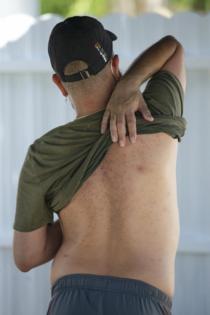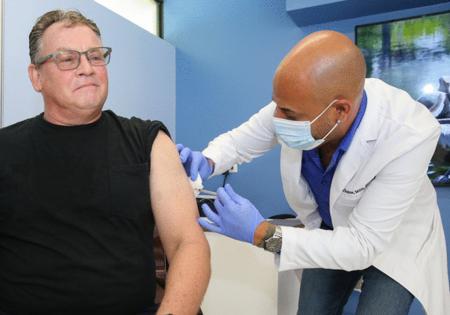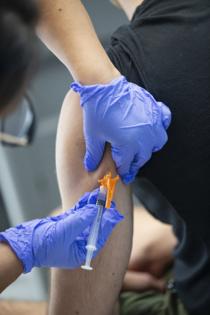A more severe form of mpox has been reported in US
Published in Health & Fitness
The United States has reported its first confirmed case of the more contagious form of mpox, formerly known as monkeypox.
The U.S. Centers for Disease Control and Prevention this week issued a health advisory, stating that while the country’s risk for the more severe form of mpox remains low, doctors should be on alert for patients with possible symptoms.
The health alert comes after California’s Department of Public Health on Nov. 15 confirmed a case of the more severe clade I mpox, just months after the World Health Organization declared a global health emergency as concerns mounted over the disease's spread in Central and Eastern Africa.
The CDC said the country’s first clade I mpox case is related to the outbreak in Central and Eastern Africa. The person had recently traveled from Eastern Africa and was treated shortly after returning to the U.S., according to the public health agency. The person is recovering at home and symptoms are improving.
“The risk of clade I mpox to the public remains low and there continue to be sporadic clade II mpox cases in the United States,” according to the CDC. Clade II mpox is considered to be a less severe form of the disease.
So far, the country has reported more than 3,000 mpox cases this year, federal and state data shows.
Here’s what to know:
Types of mpox
There are two types of mpox:
—Clade I, a more contagious form of mpox that tends to cause more severe illness and death. It is endemic to Central Africa and is causing the current outbreak in Central and Eastern Africa. “Historically, clade I mpox has caused more severe illness and deaths than clade II mpox; however, recent data demonstrate that infections from clade I mpox in the current outbreak may not be as clinically severe as in previous outbreaks,” the CDC says.
—Clade II causes less severe infections, and is what fueled the 2022 global outbreak that led to more than 32,000 infections in the United States.
There have been more than 3,000 confirmed cases of mpox in the country this year, CDC data shows. Florida has reported more than 100 cases this year, with more than half involving South Florida residents, according to preliminary data from the state’s reportable disease surveillance system.
So, who’s the most at risk for infection? What are the symptoms? And how do you treat it?
Here’s what to know:
What is mpox?
Mpox, formerly known as monkeypox, is a rare disease that is similar to smallpox, though it’s usually milder and less fatal. It can spread through intimate contact, such as kissing and sex, by direct contact with the rash and body fluids or by touching contaminated objects, such as clothing and bedding.
The disease typically occurs in the tropical rain forests of Central and West Africa and causes various symptoms, including fever and painful pimple-like rashes.
In August, the World Health Organization declared a global public health emergency for mpox, marking the second time in two years it did so. In 2022, more than 32,000 cases were reported in the U.S. during the global outbreak. The 2022 global outbreak “affected primarily (but not only) gay, bisexual, and other men who have sex with men and has spread person-to-person through sexual networks,” according to WHO. The public health emergency was declared over in May 2023.
In this year’s ongoing outbreak, there have been more than 100,000 cases of clade II mpox reported globally, including in countries where mpox was not previously reported. A large number of suspected cases in some areas involve children younger than 15.
The CDC said the mpox spread in children is “likely due to a number of factors, including spread within and between close households, younger population demographics in impacted countries, misdiagnosis of other diseases (such as measles), poor sanitary conditions, limited access to health services, and a high level of food insecurity and malnutrition.”
The public health agency does not expect “to see the same sort of risk if mpox were introduced in the United States for several reasons, including different household makeup and size, access to disinfecting products, and improved access to medical care.”
The World Health Organization on Nov. 22 is expected to hold a meeting to discuss whether the current mpox outbreak is still a public health emergency of international concern, CNN reported.
What are the symptoms and how does mpox spread?
The disease can spread through intimate contact, such as kissing and sex, by contact with the rash, body fluids, respiratory secretions or by touching contaminated objects, such as clothing and bedding, according to the CDC.
Symptoms include fever, painful pimple-like rashes and swollen lymph nodes. People diagnosed with mpox should isolate at home until all symptoms are gone. This includes waiting for the rashes turned scabs to fall and for new skin to form. The CDC says all of this can take between two to four weeks.
Who is most at risk for mpox?
According to the CDC and WHO, people with the following conditions are most at risk for severe mpox infection:
—People diagnosed with HIV, the virus that causes AIDS, or other medical conditions that severely weakens their immune system.
—Children younger than 1
—People with a history of eczema
—People who are pregnant
—People whose job may expose them to the disease, such as certain health care and laboratory workers
—Anyone who had close contact with someone who has mpox. The WHO says this includes talking, kissing, sex, touching, or having contact with clothing, towels, objects and other surfaces touched by a person with mpox.
—People who have sex with multiple or new partners
RISK LEVEL:The CDC considers the U.S. has a low risk level for mpox. “The current risk to gay, bisexual, and other men who have sex with men (MSM) who have more than one sexual partner, and people who have sex with MSM partners, is assessed as low to moderate,” the CDC said.
How to reduce your risk
To reduce your risk of falling ill with mpox, the CDC recommends washing your hands often, not touching utensils, bedding or clothing of a person ill with mpox, and avoiding intimate contact, such as hugging, kissing, sex or cuddling, with someone who has mpox or has a rash that looks like mpox. If you’re planning to be in an area where mpox is endemic, particularly in Central or West Africa, avoid contact with animals that can carry the virus, such as rodents and primates.
Is there a vaccine for mpox?
Public health experts recommend people who were exposed to someone with mpox or are at high risk of exposure to get vaccinated. The CDC also recommends vaccination for people traveling to countries with clade I outbreaks and plan to engage in sex while there. Speak with your doctor about your risk level and whether you should get vaccinated. If you’ve recovered from mpox, you don’t need a mpox vaccine dose, according to the CDC.
There are two mpox vaccines available, but the one that has predominantly been used in the country since the 2022 mpox outbreak is Jynneos.
The other vaccine, ACAM2000, is an older vaccine that was designed to prevent smallpox but can also be used to prevent mpox, which is in the same virus family. However, the ACAM vaccine tends to cause more side effects and cannot be given to people who are immunocompromised or have certain health conditions, Mary Jo Trepka, an infectious disease epidemiologist at Florida International University’s Robert Stempel College of Public Health and Social Work, previously told the Miami Herald.
Here’s what to know about Jynneos:
—Jynneos requires two shots, given four weeks apart.
—It’s made with a non-replicating live virus, which makes it a better option for people with weaker immune systems, who are pregnant or have other health conditions, according to the CDC. It’s also safe for people with HIV and atopic dermatitis, the CDC said.
—People are considered fully vaccinated about two weeks after their second shot.
—The vaccine can be given to people 18 and older who are considered to be high risk for mpox during an outbreak. The shots can also be given to kids under 18 that are considered to be high risk for mpox exposure under an emergency use authorization by the U.S. Food and Drug Administration.
How to find an mpox vaccine
Speak with your health provider and check your pharmacy and health department office for mpox vaccine availability. The CDC does have an online portal you can use to help find nearby vaccination sites, but keep in mind it’s expected to stop updating Nov. 22.
_____
©2024 Miami Herald. Visit miamiherald.com. Distributed by Tribune Content Agency, LLC.















Comments